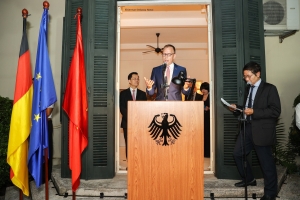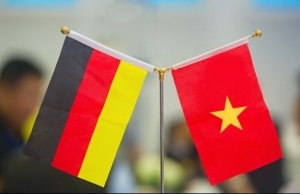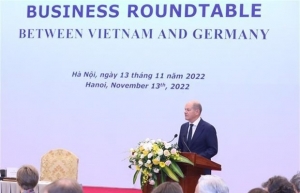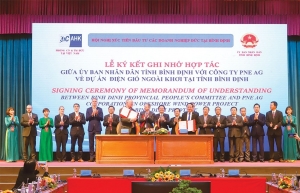Vietnam’s role in Germany’s commercial approach
 |
| Dr. Dinh Thi Ngoc Bich, Institute of European Studies |
At the first government negotiations between Germany and Vietnam as global partners in July 2021, the main areas of collaboration based on the objective of green development were announced. Thus, the two nations agreed to deepen their collaboration on crucial issues relating to sustainable development in the areas of education, labour, energy, and ecology.
Globally, BMZ has presented a new portfolio of successful collaboration partners, comprised of three primary groupings. Firstly, 42 nations comprise the group of bilateral partners collaborating to accomplish shared development objectives.
Secondly, Vietnam is one of the eight nations that constitute the group of global partners working together to solve challenges affecting the global future, such as climate change. Also, 10 nations comprise the Nexus and Peace Partnership Group, which cooperates in disaster and refugee zones to alleviate the effects of violence, war, and displacement and promotes peace building.
Thus, with the new BMZ 2030 policy, Germany discontinues bilateral collaboration with roughly a third of its partner nations and transitions to multilateral assistance and civil society. Currently, Germany cooperates with over 85 nations, giving bilateral direct assistance via the German development agency GIZ and KfW bank.
Numerous obstacles face the BMZ in supporting Vietnam’s development cooperation initiatives. The first is that the main strategy of the global alliance is to mitigate the effects of climate change, a shared global objective. In the meantime, Vietnam’s current resource priorities are to adapt to climate change, overcome natural catastrophes, establish communities susceptible to climate change, and achieve sustainable and stable growth.
According to the National Climate Change Strategy for the 2021-2050 period, 80 per cent of national financing on climate change is devoted to resilience, whereas mitigation initiatives are frequently supported externally.
Vietnam’s ability to engage in the shift from bilateral to multilateral cooperation is a further obstacle. This implies that Vietnam will have to put in more effort to fulfil existing international norms, which have historically impeded its global economic involvement. Vietnam may grow less receptive to the multilateral approach since it does not want to be constrained by international treaties.
Reducing non-refundable loans and switching to concessional financing from German-contributed funds or other sources of funding will be one of the primary modifications of this country’s new strategy. The development policy towards the 2030 Agenda further highlights that Germany would contribute to the growth of the official development assistance (ODA) budget of the EU and operate within this budget framework.
Prior to the first encounter with Vietnam as a global partner in July 2021, BMZ has made further promises of up to €113.5 million ($121 million) to assist Vietnam in executing its sustainable development model and assuming more global obligations over the following two years. However, the BMZ is no longer the primary institution responsible for administering and supporting its worldwide partners’ budgets.
In fact, the funding for development cooperation activities has fallen since Vietnam became a middle-income nation in 2014 and is headed towards becoming a developed country by 2050. There is a considerable movement towards a new collaboration paradigm that is better suited.
However, Germany remains an essential partner and a gateway for Vietnam to approach Europe, with an important basis for collaboration and growth. More than four decades of diplomatic ties and more than two decades of cooperation and development have yielded excellent outcomes for Vietnam. Despite changes in the importance of cooperation on a larger scale, Germany continues to prioritise its assistance for Vietnam’s green growth policy.
The BMZ 2030 reform process is in its early phases. Effective governance, civil rights, and anti-corruption; reform and innovations; public-private cooperation; and conformity with international supply chain norms are the cornerstones upon which the BMZ selects its partners. Vietnam needs particular policies and initiatives to continuously enhance the investment climate, attract foreign investment, and foster private investment. These are also fundamental requirements for Vietnam to continue and expand its worldwide engagement with Germany.
Notably, Vietnam’s resources for international development will not fall as a result of Germany’s new development cooperation changes. Even the reform and adaptation of Vietnam to the German government’s new international cooperation policy in a manner that better matches the demands of global issues may provide even greater potential.
Vietnam may examine the situation of Mexico, which has seen a considerable rise in German ODA for environmental concerns, when financing is handled via the environment ministry rather than the development cooperation ministry.
| The BMZ’s planned Development and Climate Alliance is a multi-stakeholder collaboration that promotes CO2 offsetting on a voluntary basis. This is an institutionalised platform for connecting projects with suppliers and developers, where projects may engage with one another to offset CO2 emissions between suppliers and users or collaborate to build climate action initiatives among interested parties. By supporting high-quality initiatives in growing and developing economies such as Vietnam, CO2 emissions are offset. In addition to addressing climate change, these initiatives advance economic and technical development and enhance the living circumstances of the local population. Thus, the initiatives contribute to the realisation of both the Paris Climate Agreement and the 2030 Agenda. |
 | German groups expanding major operations in Vietnam The bilateral strategic partnership between Vietnam and Germany is witnessing a rise in trade and investment, amid investors from the latter showing a growing interest in the former and both nations expecting a brighter cooperation outlook. |
 | Germany to support Vietnam in fostering socioeconomic growth Germany is willing to make significant efforts to support Vietnam in achieving its socioeconomic growth goals in collaboration with the target of carbon neutrality by 2050 and the phase-out of coal-fired energy by the 2040s. |
 | Vietnamese-German partnerships further flourish Economic ties between Vietnam and Germany remain in good shape, as evidenced by the latest connection activities. |
 | Vietnamese, German leaders hope for stronger economic ties A business roundtable between Vietnam and Germany was held in Hanoi on November 13 under the co-chair of Prime Minister Pham Minh Chinh and German Chancellor Olaf Scholz. |
 | Fresh German milestones to come Since Germany and Vietnam elevated their bilateral relations to a strategic partnership in 2011, the cooperation between the two countries has developed strongly in various fields. According to the Vietnamese Ministry of Planning and Investment, as of December 20, 2022, Germany had over 440 valid projects in Vietnam registered at $2.37 billion, mainly focused on manufacturing, processing, and energy. Currently, about 500 German enterprises are active in Vietnam, creating 50,000 jobs. |
What the stars mean:
★ Poor ★ ★ Promising ★★★ Good ★★★★ Very good ★★★★★ Exceptional
 Tag:
Tag:
Related Contents
Latest News
More News
- Hermes joins Long Thanh cargo terminal development (February 04, 2026 | 15:59)
- SCG enhances production and distribution in Vietnam (February 04, 2026 | 08:00)
- UNIVACCO strengthens Asia expansion with Vietnam facility (February 03, 2026 | 08:00)
- Cai Mep Ha Port project wins approval with $1.95bn investment (February 02, 2026 | 16:17)
- Repositioning Vietnam in Asia’s manufacturing race (February 02, 2026 | 16:00)
- Manufacturing growth remains solid in early 2026 (February 02, 2026 | 15:28)
- Navigating venture capital trends across the continent (February 02, 2026 | 14:00)
- Motivations to achieve high growth (February 02, 2026 | 11:00)
- Capacity and regulations among British areas of expertise in IFCs (February 02, 2026 | 09:09)
- Transition underway in German investment across Vietnam (February 02, 2026 | 08:00)






















 Mobile Version
Mobile Version